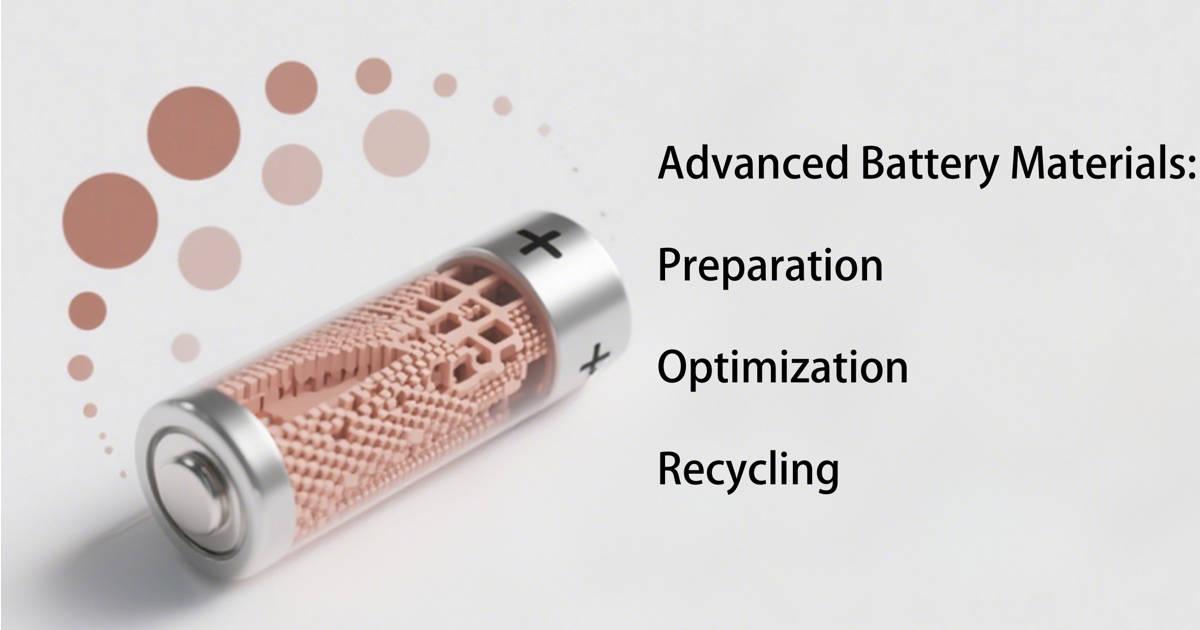- 3.2Impact Factor
- 6.4CiteScore
- 16 daysTime to First Decision
Advanced Battery Materials: Preparation, Optimization and Recycling
This special issue belongs to the section “Energy Materials“.
Special Issue Information
Dear Colleagues,
Advanced battery technologies employ diverse electrode materials, electrolytes, and additives. For critical applications in electric vehicles, portable electronics, and energy storage systems, the focus lies on high-capacity cathodes, durable anodes, and novel electrolytes. These encompass transition metal oxides, carbon-based materials, solid-state electrolytes, and multifunctional composites featuring intricate microstructures, such as nanostructured coatings and conductive polymer blends.
Analyzing these materials—characterized by varied properties, morphologies, and sizes (e.g., lithium-ion battery electrodes)—requires consideration of electrode–electrolyte interfaces under diverse operating conditions, including charge–discharge cycles, temperature extremes, mechanical stress, and voltage fluctuations.
Advanced battery materials must satisfy multiple performance criteria: high energy and power density, long cycle life, good rate capability, thermal stability, and safety. Equally important are non-performance factors like cost-effectiveness, environmental impact, resource availability, ease of synthesis, and recyclability.
This Special Issue aims to elucidate the fundamental principles governing material synthesis, performance optimization, and recycling processes. Crucially, macroscopic properties such as energy storage capacity and cycle stability are governed by underlying mechanisms operating across multiple sub-observational scales. Understanding how these mechanisms dictate performance and recyclability is essential for analyzing existing materials and designing improved, innovative alternatives.
Multiscale modelling, which bridges or simultaneously accounts for nano-, micro-, and macro-scale phenomena, is particularly valuable for advanced battery materials due to its well-defined hierarchical structure across these levels.
Dr. Weijia Meng
Dr. Xiaoyong Fan
Guest Editors
Manuscript Submission Information
Manuscripts should be submitted online at www.mdpi.com by registering and logging in to this website. Once you are registered, click here to go to the submission form. Manuscripts can be submitted until the deadline. All submissions that pass pre-check are peer-reviewed. Accepted papers will be published continuously in the journal (as soon as accepted) and will be listed together on the special issue website. Research articles, review articles as well as short communications are invited. For planned papers, a title and short abstract (about 100 words) can be sent to the Editorial Office for announcement on this website.
Submitted manuscripts should not have been published previously, nor be under consideration for publication elsewhere (except conference proceedings papers). All manuscripts are thoroughly refereed through a single-blind peer-review process. A guide for authors and other relevant information for submission of manuscripts is available on the Instructions for Authors page. Materials is an international peer-reviewed open access semimonthly journal published by MDPI.
Please visit the Instructions for Authors page before submitting a manuscript. The Article Processing Charge (APC) for publication in this open access journal is 2600 CHF (Swiss Francs). Submitted papers should be well formatted and use good English. Authors may use MDPI's English editing service prior to publication or during author revisions.
Keywords
- advanced battery materials
- multiscale modeling
- electrode-electrolyte interfaces
- performance optimization
- material synthesis
- recycling processes
- energy density
- cycle stability
- solid-state electrolytes
- transition metal oxides

Benefits of Publishing in a Special Issue
- Ease of navigation: Grouping papers by topic helps scholars navigate broad scope journals more efficiently.
- Greater discoverability: Special Issues support the reach and impact of scientific research. Articles in Special Issues are more discoverable and cited more frequently.
- Expansion of research network: Special Issues facilitate connections among authors, fostering scientific collaborations.
- External promotion: Articles in Special Issues are often promoted through the journal's social media, increasing their visibility.
- e-Book format: Special Issues with more than 10 articles can be published as dedicated e-books, ensuring wide and rapid dissemination.

